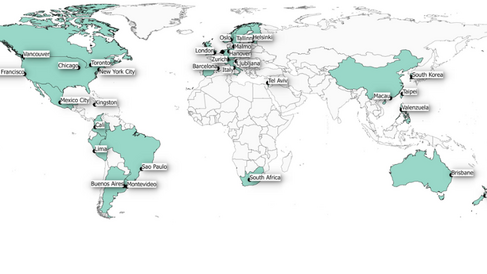
“A global analysis of the impact of COVID-19 stay-at-home restrictions on crime” - published in Nature Human Behaviour - discusses the first set of findings of our collaborative research project Crime during the Covid-19 Crisis: A Global Analysis, which collected data in 27 cities in 23 countries through a network of researchers from universities across the world.
The paper focuses on how the stay-at-home restrictions adopted to control the spread of Covid-19 affected urban crime in the Americas, Europe, the Middle East and Asia. The findings show that these restrictions led to a significant drop of crime in cities, particularly in urban areas where restrictions in public spaces were stronger.
The paper has been received with huge interest and is gathering international media attention, with researchers being interviewed for TV and radio programmes, and findings being covered in print and digital publications.
Selected media coverage
Guardian (UK)https://www.theguardian.com/science/2021/jun/02/urban-crime-plummets-during-lockdowns-cities-around-world
The Conversationhttps://theconversation.com/lockdowns-reduced-urban-crime-by-over-a-third-around-the-globe-but-some-cities-benefited-more-than-others-162212
CNN (US)https://us.cnn.com/2021/06/02/health/pandemic-lockdowns-crime-study/index.html
Dutch mediahttps://www.rtvutrecht.nl/nieuws/2184556/uu-minder-criminaliteit-in-wereldsteden-door-lockdowns.html
https://www.trouw.nl/buitenland/corona-maakte-de-wereld-een-stuk-veiliger-voor-eventjes-dan~b0cdff29/El Pais (Spain)https://elpais.com/ciencia/2021-06-02/los-confinamientos-por-la-covid-19-redujeron-la-criminalidad-en-un-37.html
Delo (Slovenia) https://www.delo.si/novice/slovenija/epidemija-precej-oklestila-urbani-kriminal/
- German media https://www.sueddeutsche.de/panorama/kriminalitaet-studie-kriminalitaet-durch-lockdowns-weltweit-gesunken-dpa.urn-newsml-dpa-com-20090101-210603-99-843005
https://www.zeit.de/news/2021-06/03/studie-kriminalitaet-durch-lockdowns-weltweit-gesunken?utm_referrer=https%3A%2F%2Fapp.meltwater.com%2F
https://www.welt.de/regionales/niedersachsen/article231552983/Studie-Kriminalitaet-durch-Lockdowns-weltweit-gesunken.html
More coverage is visible on the Altmetric's page. Feature on the University of Cambridge's website: Urban crime fell by over a third around the world during COVID-19 shutdowns.
Paper
Nivette, A.E., Zahnow, R., Aguilar, R. [...] Eisner, M. et al. (2021). A global analysis of the impact of COVID-19 stay-at-home restrictions on crime. Nat Hum Behav. https://doi.org/10.1038/s41562-021-01139-z
Abstract
The stay-at-home restrictions to control the spread of COVID-19 led to unparalleled sudden change in daily life, but it is unclear how they affected urban crime globally. We collected data on daily counts of crime in 27 cities across 23 countries in the Americas, Europe, the Middle East and Asia. We conducted interrupted time series analyses to assess the impact of stay-at-home restrictions on different types of crime in each city. Our findings show that the stay-at-home policies were associated with a considerable drop in urban crime, but with substantial variation across cities and types of crime. Meta-regression results showed that more stringent restrictions over movement in public space were predictive of larger declines in crime.
